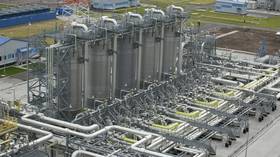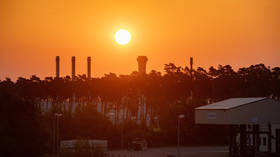Russian energy giant explains gas flow reduction to EU

Russia had to reduce its gas flow to Europe through the Nord Stream 1 pipeline due to turbine malfunctions, Gazprom Deputy Chief Executive Vitaly Markelov said on Friday. The issues are due to German company Siemens – which produces the turbines – failing to fulfill its commitments, he told Russia-24 TV.
Siemens has so far eliminated only one-fourth of the total number of discovered malfunctions affecting its turbines, Markelov said. On Wednesday, the Nord Stream 1 operator Gascade reported that gas flow through the pipeline had been reduced to one-fifth of its maximum capacity. A day before that, Gazprom warned that it would have to stop the operation of its second Siemens turbine for an overhaul.
After the switch-off, gas flow through Nord Stream 1 was not expected to exceed 33 million cubic meters per day. The move came as the energy giant was still waiting for another turbine for the pipeline that was due to arrive from Germany after undergoing maintenance in Canada.
“Our European partners accuse us of reducing gas supply to Europe without sufficient reasons. Yet, nothing can be further from the truth,” Markelov said, adding that it was the company’s Western partners who “fail to fulfill their obligations – contractual obligations – for the compressor station maintenance.”
According to an earlier report by business daily Kommersant, several turbines at the Portovaya compressor station located on Russia’s Baltic coast are in need of servicing. The current licensing agreement allows Siemens Energy to accept five more turbines for maintenance work before the end of 2024.
“We call on our partners to resolve their own issues as soon as possible,” the deputy CEO said, adding that the gas supply to Europe would then “go back to normal in no time.” Markelov added that his company plans to release part of its correspondence with its Western partners to the public. Some documents were published hours later.
The reduction of supply from Russia has led to a spike in gas prices in Europe, which rose by more than 20% to over $2,500 per thousand cubic meters on Wednesday. European leaders then blamed Russia for the gas price hikes.
Last week, German Chancellor Olaf Scholz said Berlin could no longer rely on Russia when it comes to gas supplies, sparking an angry reaction from Moscow, which said that such statements “absolutely contrast with reality and with the history of supplies.”
The developments follow a dispute over a Siemens turbine that had been sent to Canada for repairs, but was not returned by Ottawa on time due to the sanctions on Moscow over its military operation in Ukraine. Gazprom cited the delay as the reason for the 60% reduction in gas flow through Nord Stream 1 in June. After negotiations with Berlin, Ottawa decided to use an indirect delivery route to avoid violating sanctions.













